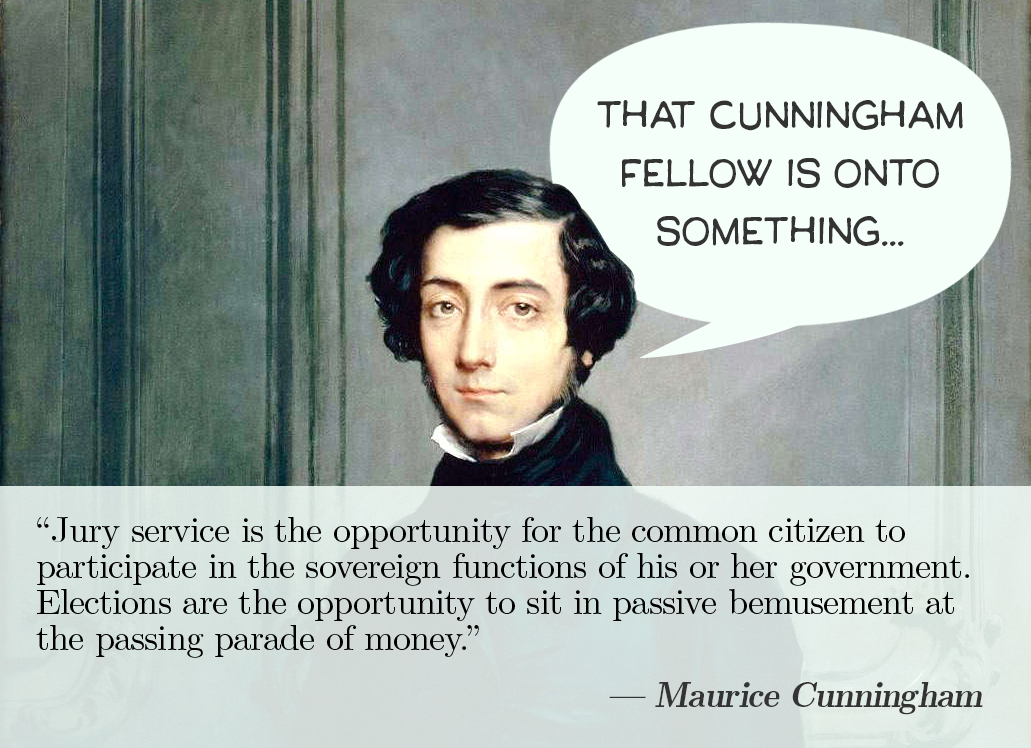
In our fatally dysfunctional political system the jury is one institution that still upholds the importance of the citizen.
The jury, wrote Alexis de Tocqueville, is primarily a political institution and trial by jury “an eminently republican element in the government.” It is “one form of the sovereignty of the people.”
Tocqueville was always interested in democratic processes that might educate the individual in the duties and responsibilities of citizenship. The jury “invests each citizen with a kind of magistracy; it makes them all feel the duties which they are bound to discharge towards society and the part which they take in its government. By obliging men to turn their attention to other affairs than their own, it rubs off that private selfishness which is the rust of society. “
Thus last week I gathered with thirteen other citizens (none of whom were corporations who are people, by the way) to await possible empanelment on a civil or criminal trial in Lowell District Court. Massachusetts long ago adopted the one-day or one-trial system of jury service in which (with very narrow exceptions) each and every citizen must participate. From the judges to the lawyers to clerks and court officers, all treated the jurors as important figures in the justice system and worthy of respect. After a process of juror challenges I was chosen with five others to sit on a criminal trial; the rest were sent off to a civil trial session.
We were instructed in our obligations and the law by a district court judge and heard arguments and observed evidence put on by able attorneys. When it came time to deliberate on the case we were brought to a small conference room where each juror had his or her opportunity to discuss the case, to present others with recollections of the evidence, assessment of the witnesses’ demeanor, and impressions of the weight of the evidence. No citizen had a more powerful voice than another citizen or, in other words, each citizen was equal. Tocqueville would have liked this; he was much taken with equality among citizens in America.
Thus the jury system still stands out in a democracy that has gone seriously out of control. Corporations may not be people my friend who can be called to jury service, but they are people who can contribute unlimited funds to influence American politics and governance. They and the extraordinarily wealthy – the one percent – have an outsized importance in our politics that the collective wisdom of the people cannot match.
What does all that money buy? Television ads of course – ads that are both tawdry and tedious: tawdry in their cartoonishly outrageous (but sometimes persuasive) claims; tedious in that we see it all in it scary black and white dreariness, overlaid with ominous music, every two years. Our job as citizens is to sit mutely in front of our television sets absorbing all this in our impotence. Yell all you want at the ads – but the candidates won’t answer back, the SuperPACs won’t respond.
SuperPACS (IEPACS in Massachusetts lingo) now must disclose their top five contributors. If Chris Collins, Lisa Collins, Beth Myers, Kelly O’Neill, and Beth Lindstrom (president of the Commonwealth Future Independent Expenditure PAC) were called to jury service, they’d have to converse equally with other jurors. We’ll never talk to them or look them in the eye though. It would be even tougher to converse with the top contributors of the anti-Baker Mass Independent Expenditure Committee since they are all people who are unions. I suppose we could ask Tiffany Beck, the co-chair of the PAC who delivers the legal disclaimer at the end.
Or perhaps a new task could be found for the jury – we could ask each of these citizens if they really believe the dark accusations placed in their ads, that Martha Coakley doesn’t care about vulnerable children; or that Charlie Baker is an uncaring economic royalist. Then we could perform the juror’s function of assessing their credibility.
That isn’t where our democracy is though folks.
Jury service is the opportunity for the common citizen to participate in the sovereign functions of his or her government. Elections are the opportunity to sit in passive bemusement at the passing parade of money.

